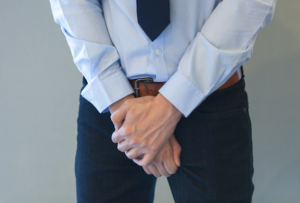 Experiencing the urgent, overwhelming need to urinate is never a pleasant feeling, especially when it’s so sudden that you have trouble making it to the bathroom in time.
Experiencing the urgent, overwhelming need to urinate is never a pleasant feeling, especially when it’s so sudden that you have trouble making it to the bathroom in time.
Feeling the urge to “go” more often is common if you’ve been drinking fluids in excess, particularly carbonated beverages with artificial sweeteners, coffee/tea with caffeine, or alcohol. Some foods — such as tomatoes, high-citrus fruits, and cranberries — might even make you take more trips to the bathroom.
So when does an active bladder become “overactive?”
Doctors agree that you shouldn’t feel the need to urinate more than eight times in a 24-hour period. Taking constant trips to the bathroom throughout the day, regardless of fluid intake, may be a sign of OAB. Some might experience the feeling of a full bladder, yet only a small amount of urine is expelled; others may experience incontinence or leaking urine.
About 33 million Americans have overactive bladders, and as many as 30 percent of men — and 40 percent of women – in the U.S. live with OAB symptoms, according to the American Urological Association.
OAB can get in the way of your work life, social life, and exercise routine, and may create feelings of embarrassment or anxiety. It may also affect your sleep if you’re waking up two or more times each night to urinate; sleep disruptions over time can be harmful to your health and overall well-being.
If you’re experiencing symptoms, it’s important to consult a urologist and explore treatment options. Involuntary contractions of the bladder may be the result of an underlying health condition, such as diabetes, an enlarged prostate, or bladder stones.
It may be helpful to keep track of any foods or beverages that increase symptoms and avoid them when necessary. Spicy foods, processed foods, and raw onions can all affect bladder control.
It’s worth noting that so-called “stress urinary incontinence” is different than OAB, and typically involves the expulsion of small amounts of urine while sneezing, laughing, or doing physically demanding activities.
Dr. Harry Tsai of Fort Meyers Urology, with offices in Fort Meyers and Cape Coral, is a member of the Independent Physicians Association of Lee County — a network of independent physicians committed to maintaining high-quality medical care in southwest Florida. For help selecting an independent physician or for more information on IPALC, call 239-314-0791 or visit the organization’s website.
Share on Facebook



 Southwest Florida Medicine.com is dedicated to bringing you the very best health information available today!
Subscribe or check back regularly!
Southwest Florida Medicine.com is dedicated to bringing you the very best health information available today!
Subscribe or check back regularly!